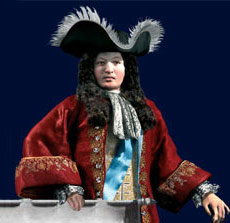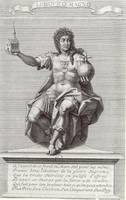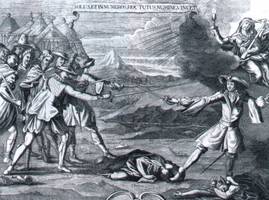His care to maintain a certain orthodoxy, and the conception which he had formed of the religious unity of his kingdom, expressed themselves in his policy towards the Jansenists, the Quietists, and the Protestants.
Louis XIV and Jansenism
The concern felt by Louis on the subject of Jansenism was so great that, in 1665, he appealed to Pope Alexander VII to break down the opposition of Pavillon, Bishop of Alet, who did not recognize the right of assembly of the clergy to legislate for the Church, and was carrying on a campaign against the formula drawn up by that assembly and against the obligation to sign it. France was presented with the spectacle of a joint effort of the pope and the king; the royal council annulled a charge in which Pavillon, after having given the required signature to another formula drawn up by the pope, developed some new Jansenistic theories on grace; the pope, without arousing any feeling on the king's part, himself appointed a commission of French bishops to try Pavillon and three other bishops who refused to make the unreserved submission. Presently, in December, 1667, nineteen bishops wrote to the king that the appointment of such a commission by the pope was contrary to the Gallican liberties. The difficulties appeared insurmountable; but the nuncio, Bargellini, and the foreign secretary, Lionne, found a way. The four bishops signed the formulary and caused it to be signed, at the same time explaining their action in a letter expressed with such intentional ambiguity that it was impossible to make out whether their signatures had been give pure et simpliciter or not; the pope, in his reply to them, took care not to repeat the words pure et simpliciter and spoke of the signatures which they had given sincere. It was Lionne who had suggested to the pope the employment of this word sincere. And thanks to these artifices, "the peace of the Church" was restored.
The question of Jansenism was revived, in 1702, by the case of conscience which the Jansenists presented to the Archbishop of Paris: "Is a respectful and silent submission to the decision of the Church sufficient in regard to the attribution of the five propositions to Jansenius?" Again the pope and the king were unanimous against Jansenism. In February and April, 1703, Clement XI called upon Louis XIV to intervene, and in June, 1703, Louis XIV asked Clement XI for a Bull against Jansenism. To keep peace with the Jansenists, however, the king at the same time begged the pope to particularly mention in the Bull that it was issued at the instance of the French Court. Clement, not wishing to yield to this Gallican suggestion, temporized for twenty-six months, and the Bull "Vineam Domini" (15 July 1705) lacked the rhetorical precautions desired by Louis. The king, nevertheless, was glad to take it as it was. He hoped to make an end of Jansenism. But Jansenism from that time forward maintained its resistance on the ground not of dogma but of ecclesiastical law; the Jansenists invoked Gallican liberties, asserting that the Bull had been issued in contravention of those liberties. More and more plainly the king saw in Jansenism a political danger; he thought to destroy the party by razing the convent of Port-Royal des Champs, dispersing the religious and disinterring the buried Jansenists (1709-11); and he sacrificed his Gallican ideas to the pope when he forced an extraordinary assembly of the clergy, in 1713, and the parliament, in 1714, to accept the Bull "Unigenitus" which Clement XI had published against Quesnel's book. But at the time of his death he wished to assemble, for the trial of Noailles, Archbishop of Paris, and the bishops who resisted the Bull, a national council to which he was to dictate, and Clement XI, naturally, scouted this idea as bearing the marks of Gallicanism. Thus was Louis XIV ever anxious for an understanding with Rome against Jansenism, and in this alliance it was he who displayed the greater fury against the common enemy. At the same time, he brought to his warfare against Jansenism a Gallican spirit, making concessions and displays of politeness to the Holy See when the conduct of the struggle required, but on other occasions using methods and terms to which Rome, rightly impatient of Gallican pretensions, was obliged to take exception .
Louis XIV and Quietism
Louis XIV and Protestants
In 1698 intendants and bishops were consulted as to the measures to be taken in regard to the Protestants. Bossuet, Archbishop Noailles, and almost all the bishops of northern and central France declared for a purely spiritual propaganda animated by a spirit of gentleness; Bossuet maintained that Protestants must not be forced to approach the sacraments. The bishops of the South, on the contrary, leaned to a policy of constraint. As a result of this consultation, the edict of 13 December, 1698, and the interpreting circular of 7 January, 1699, inaugurated a milder regime and, in particular, forbade anyone to compel Protestants to approach the sacraments. Lastly, at the end of his reign, Louis ordered a new inquiry into the causes and the persistence of the heresy, and decreed, by the declaration of 8 March, 1715, that all Protestants who had continued to reside in the kingdom since 1685 were liable to the penalties of relapsed heretics unless they became Catholics. This amounted to an implicit admission that the edict of 1685 had meant to command all Protestants to embrace Catholicism. The alliance between the revolted Protestants of the Cevennes (the Camisards, 1703-06) and England, the enemy of France, had driven Louis to adopt this policy of sternness.
The attitude of Innocent XI in regard to the persecution of Protestants and the grave and mature deliberation with which Clement XI proceeded against the Jansenists prove that, even at those very moments when the religious policy of Louis XIV was resting upon, or was invoking, Rome, the full responsibility for certain courses of precipitancy, of violence, and of cruelty must rest with the king. Aspiring to be master in his Church, he chastised Protestants and Jansenists as disobedient subjects. Though there may have been a parallelism of action and a reciprocity of services between Louis and the Holy See, still the ideas which inspired and guided the religious policy of the king were, in fact, always unlike those of the contemporary popes. "Louis XIV," says the historian Casimir Gaillardin, "assumed to direct the conversion of his subjects at the whim of his pride, and by ways which were not those of the Church and the sovereign pontiff."
Source:
The Catholic Encyclopedia, Volume IX




